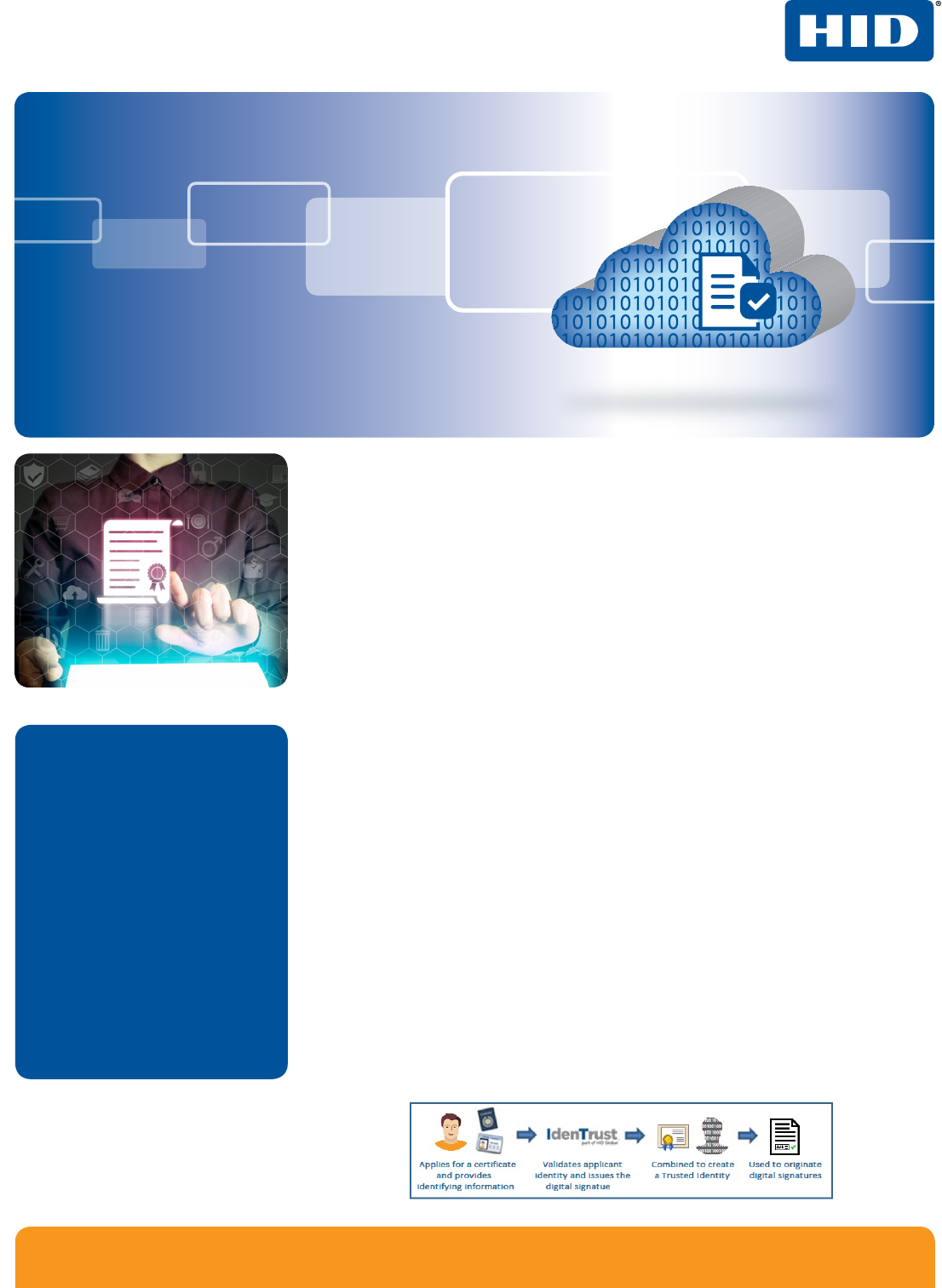
DIGITAL CERTIFICATES
Digital Signing Using Identity-Based Certificates
The use of digital signatures is becoming
more commonplace both in the workplace
and for personal use. However, the dierence
between digital signing and electronic
signing is not widely understood.
True digital signing requires that the signer
use a credential (such as a digital certificate)
that is bound to his or her identity. Binding
the identity of a signer to the credential that
is used for signing creates assurance that
the individual who is signing a document
really is who they say they are.
When an identity-based credential is
used, the signature is considered non-
repudiable and is legally binding.
How to Obtain an Identity-Based Certificate
Obtaining an identity-based credential
is similar to the process of applying
for a driver’s license or passport.
Digital Signing is Easy to Deploy and Use
Digital signing, through the use of a Trusted
Identity, can be used to transact business in a
virtual world. This introduces added convenience
and the elimination of paper, while creating an
auditable and verifiable electronic workflow.
IdenTrust identity-based certificates are
compatible with standard applications that
support digital signing such as Adobe® and
Microsoft® Word, Excel and Outlook.
Multiple Options to Meet Your Business Needs
Depending on the identity-based certificate
you select, it can be stored in your internet
browser or in a hardware token or smart card,
providing added convenience and portability.
Some identity-based certificates can also
be used for data and email encryption,
helping you to secure your confidential
documents and communications.
hidglobal.com
IdenTrust
®
Digital
Signing Solution
DIGITAL SIGNING OFFERS MULTIPLE BENEFITS
Non-Repudiation - Digital certificates that are bound to a trusted identity are
used to digitally sign electronic documents, creating a binding and non-repudiable
signature.
Inherent Applicability - Digital certificate protocol is embedded in Adobe® and
Microsoft® products facilitating a turn-key implementation for digital signing.
Improved Processes - Digital signing allows an organization to streamline signature
and approval processes, eliminate paper and establish an audit trail.
Multiple Uses - Electronic documents can be incorporated into online applications,
standalone processes and attached to email.
Identity-Based Certificates:
Contain information about the
certificate holder that has been
independently verified before
certificate issuance
Facilitate Digital Signing (vs.
Electronic Signing)
Can be issued to an individual
person or to an individual who
represents a specific organization
Are used to sign documents and
email communications
Create a legally-binding digital
signature
Fulfill requirements to transact
business with state and federal
government agencies

SPECIFICATIONS
Software-Based Certificates
Personal/Individual or Aliated/Business Certificates
Install in a browser
• Microsoft® Internet Explorer v9+
• Mozilla® Firefox
1, 2 and 3 year validity periods are available
• Renewable online prior to certificate expiration (new certificate fee
applies)
Hardware-Based Certificates
All of the features of a software-based certificate and installed in a
device providing portability and added security:
• Token
• Smart card
• Smart card and OMNIKEY® reader
• Reuse purchased hardware device at renewal (no fee applied)
Integrated Signing Applications
Adobe® Reader
Microsoft® Oce products
Supported Platforms
Microsoft® Windows v7, 8x and 10
Apple® iOS
Google® Android
Additional platforms may be supported based on specific certificate
type
Technical Specifications
X509 v3 digital certificates
2048+ bit key length
SHA-256 hashing algorithm
Certificate Revocation List (CRL) and Online Certificate Status
Protocol (OCSP) validation
Annual WebTrust for Certification Authority audit
IT IS IMPORTANT TO UNDERSTAND THE DIFFERENCES BETWEEN ELECTRONIC SIGNING AND DIGITAL SIGNING:
ELECTRONIC SIGNING
A functional term
Not technically bound to a specific individual or validation process
Created through multiple options such as typed names, scanned
images or a “click-wrap” agreement on a web site
Legal, but not easily audited and can be repudiated
Cannot be verified through electronic means
DIGITAL SIGNING
A legal term
Tied to a specific individual via a PKI-based digital certificate
Created using a digital algorithm to bind the document using a
digital certificate, resulting in a unique “fingerprint”
Non-repudiable and auditable
A “hash” of the content being signed – any tampering will be
evident
TM
Other Certificate Features
Other available features are
defined based on the type of
certificate and the program under
which it is issued.
Use when interoperability
with U.S. Government
applications is required
Secure emailed
communications using digital
signing and encryption
Combine a digital certificate
and an electronic professional
seal to replace traditional
signing and sealing processes
An ASSA ABLOY Group brand
For IdenTrust Sales inquiries: +1 866-IDENTRUST | +1 866- 433-6878 | sales@identrust.com
© 2017 HID Global Corporation. All rights reserved. HID, HID Global, the HID Blue Brick logo, the Chain Design, OMNIKEY and IdenTrust are trademarks
of HID Global and may not be used without permission. All other trademarks, service marks, and product or service names are trademarks or
registered trademarks of their respective owners.
2017-04-19-iam-identrust-doc-sign-sol-ds-en PLT-03301
North America: +1 512 776 9000
Toll Free: 1 800 237 7769
Europe, Middle East, Africa: +44 1440 714 850
Asia Pacific: +852 3160 9800
Latin America: +52 55 5081 1650
hidglobal.com
